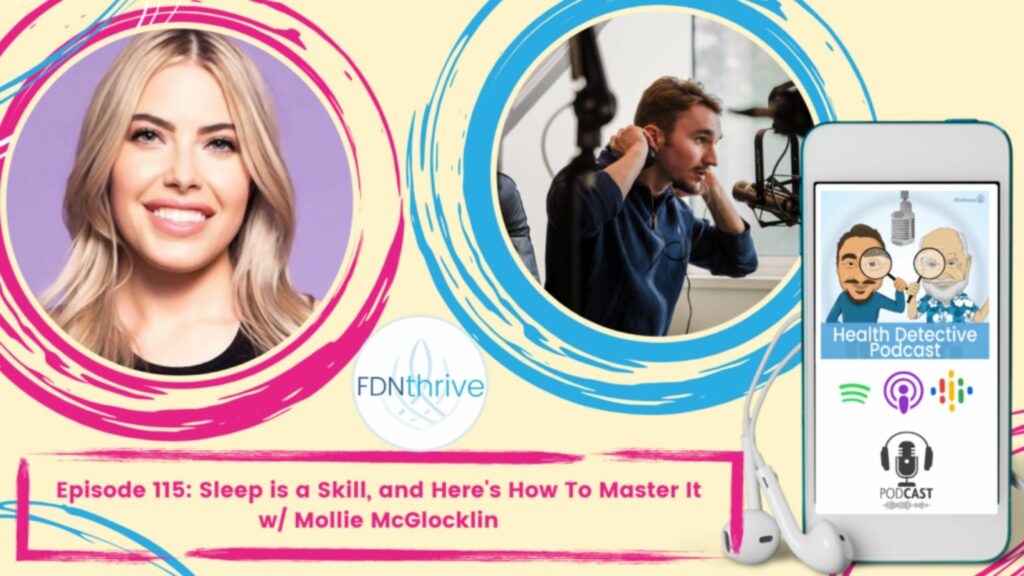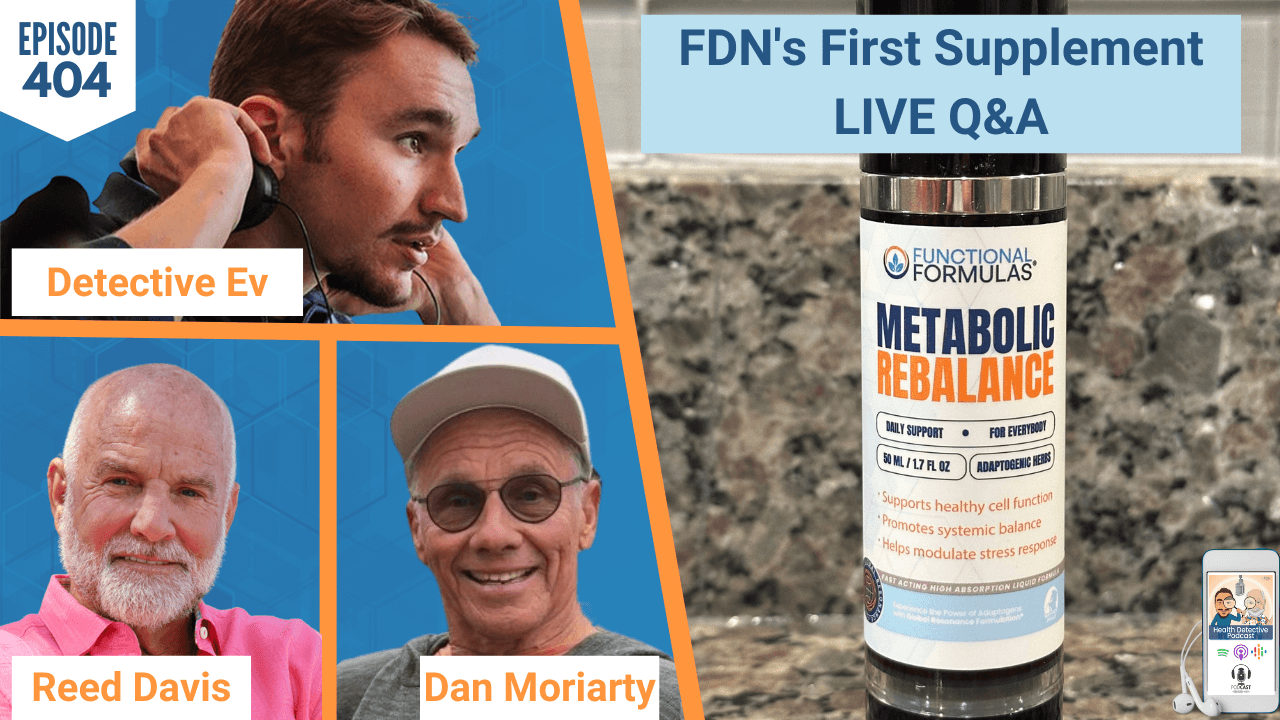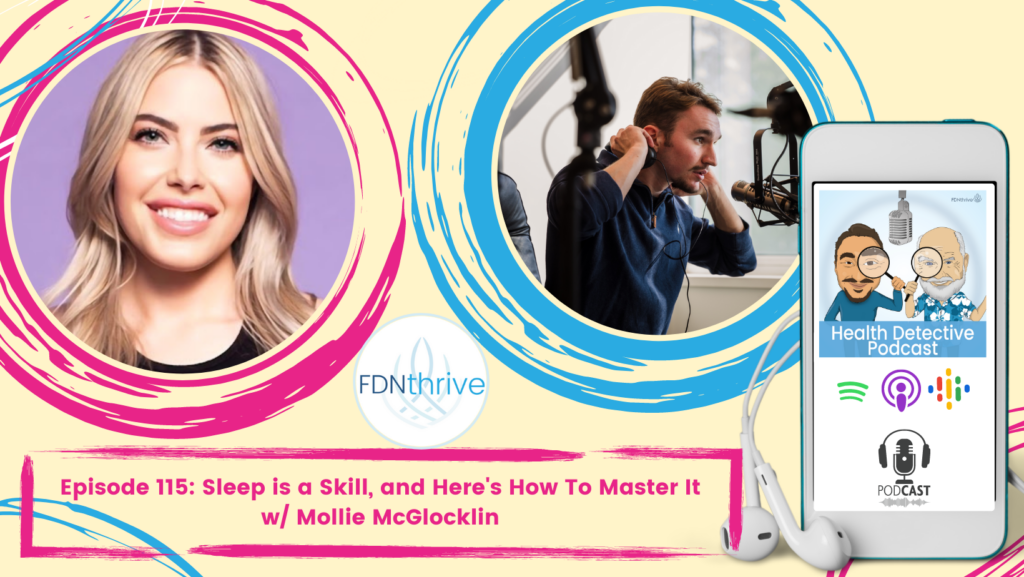
[00:01:05] Detective Ev: What is going on my friends? Welcome back to another episode of the Health Detective Podcast by FDNthrive. My name is Evan Transue, AKA Detective Ev. I will be your host for today’s show. I loved this show in particular because I had the privilege of talking to fellow biohacker, Miss Mollie McGlocklin, and she is the creator of Sleep Is A Skill, and the host of the Sleep Is A Skill podcast.
Mollie’s Background

Sleep Is A Skill is a company that optimizes people’s sleep through a unique blend of technology, accountability, and behavioral change. After navigating insomnia while traveling internationally, she created what she couldn’t find – a place to go to learn the skillset of sleep. With a background to behavioral change from the Nonverbal Group, she became fascinated with chronobiology and its practical application to sleep and our overall experience of life. Knowing the difference between a life with sleep and without, she’s now dedicated her life to sharing the forgotten skillset of sleep.
I not only appreciate this from the bio-hacker perspective, but I also appreciate it from a personal perspective because I am someone that even when I was deeply into the functional medicine world, I still could not figure out the sleep thing. I had been eating organic and doing all these things that I thought were correct for probably three years, and I was still finding myself going to bed at 1:00, 2:00, or even 3:00 in the morning.
I underplayed greatly how much it meant, and that eight hours really isn’t eight hours. I thought as long as I did 1:00 to 9:00, it wasn’t that big of a deal. Well, it turns out all hours are not created the same, especially when it comes to sleep.
And that whole 9:00 to 5:00, 10:00 to 6:00 type of thing is so much better for us than a 1:00 to 9:00 or a 2:00 to 10:00 or, oh my goodness, I hear some people doing 4:00 to 12:00. I’m like, are you crazy? Do not do that. Most people would say, well, I wouldn’t do that, but I don’t know how to sleep. That is what we will be talking about today.
Introduction
Hey there, Mollie. Welcome to the Health Detective Podcast.
[00:03:36] Mollie: Oh, thank you so much for having me. I’m very excited for this conversation.
[00:03:40] Detective Ev: Yes. And for those watching on video and not just audio, you will see me with my blue light blocking glasses on. Ones that are actually measured under a spectrometer and not just bought randomly off Amazon.
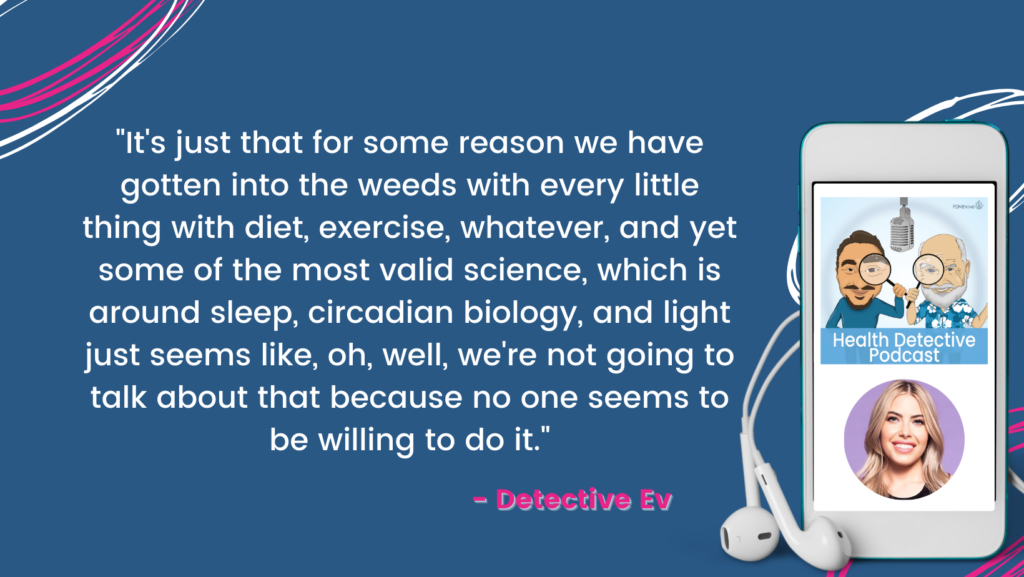
I’m a huge sleep freak. I am someone who believes that this is a really neglected topic in the functional space. Mollie and I were talking before, that’s not to say that any good health coach or health practitioner, wouldn’t tell you that you need to sleep. It’s just that for some reason we have gotten into the weeds with every little thing with diet, exercise, whatever, and yet some of the most valid science, which is around sleep, circadian biology, and light just seems like, oh, well, we’re not going to talk about that because no one seems to be willing to do it.
It’s almost too big of a task. It is objectively weird in today’s world that I’m wearing these glasses, even though there is science backing up that these absolutely work. Even if I’m l exposing my skin to artificial light, it still has a benefit. Although, in a perfect world, we wouldn’t do either. But I digress.
We’re going to learn a lot today, I think. We’re going to talk about how sleep is actually a skill. I’m curious because I actually don’t know this about you. Were you someone that dealt with health issues or sleep issues before getting into this space? Or did you find yourself getting here another way?
Getting Into the Sleep Space
[00:04:45] Mollie: Yeah. Great question. And one too, just thank you so much for having me and for also just your own clear passion and conviction on this topic and living in alignment with that, to your point of often it’s outside of the bell curve for us to be doing some of the things that can help with our circadian rhythm. The fact that you’re willing to be a pioneer is fantastic. I’m excited to speak more.
But yeah, it is a great question because I think it does further underscore and paint the picture for why create a company around optimizing sleep. Like what’s there? And certainly, my story, I think helps with the conversation because it was really just a conversation of solving my own problem with my own sleep.
What that looked like was for many, many years living as a serial entrepreneur in Manhattan, burning the candle at both ends, not having any idea what time the sun is rising or setting, and living kind of like a vampire, or what have you. Going to bed late. Waking up late. All of those things.

I had a lot of stories and labels around my sleep. I had it that I’m a short sleeper, I’m a bad sleeper. I’m a night owl. It’s in my genes. All of these things that it’s like a fixed thing and really nothing to look at that much. Just sort of survive it and that’s how it is for me. It was like that for many years.
My habits often got even more solidified or even augmented. Over time I’m going to bed later and later and later. At some point the sun is rising and I’m pretty much going to sleep and I’m justifying and I’m righteous about it. I say, well, it’s fine. I make my own hours. I can sleep in, who cares?
Not noticing all of these things around my health that are starting to deteriorate, anxiety going up, having shingles in my twenties, having the beginning of an ulcer. I mean, just a number of things that are showing that things are just not really working, how I’m managing things. It wasn’t until I was traveling internationally and kind of taking on the first steps of Tim Ferriss type lifestyle, you know, digital nomad life.
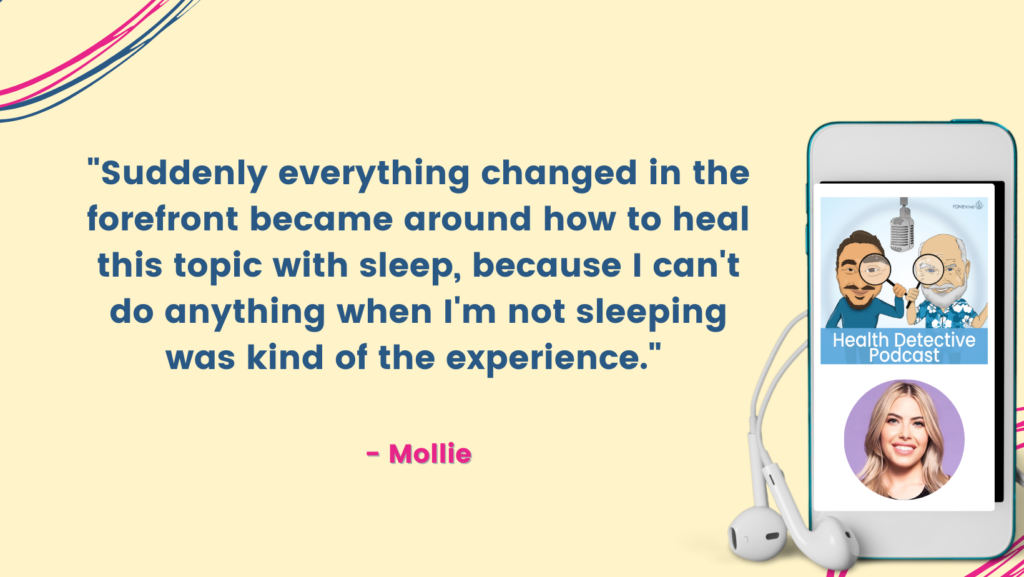
Healing Sleep Became the Focus
With just the stress of running businesses on the road, my fiancé and I, my stress level was so high that I got to a point – the first clear symptom of just this real inability to sleep. Suddenly everything changed in the forefront became around how to heal this topic with sleep, because I can’t do anything when I’m not sleeping was kind of the experience. But also, it felt like I’m losing my mind, like this is maddening. I’m so anxious. All of these things. And at my lowest point, I went to the doctors in Croatia and left with their version of Ambien. It was kind of that clear thing that I need to get up under this.

Flash forward. Really then went down the rabbit hole, understanding and learning all that I could around circadian rhythm entrainment, chronobiology, the science of time conversation. It just changed my life so dramatically. Of course, over time then healed my sleep and not just getting back to homeostasis because as I shared my sleep wasn’t that great before. But really being able to objectively and quantifiably improve my sleep markers to a level that I never thought was possible for myself was just amazing. Like it changed my life.
I started working just organically with people that were struggling out of a place of empathy, the one-on-one small groups, and then it led to this creation of Sleep Is A Skill. Now we’re in hotels, we work with high performers, a lot of poker players you know, UFC. And from that place, now we have just this whole creation around sleep optimization.
We do a lot to help support people on wherever they might be to improve their sleep and really up level, even if you’re really advanced in your sleep state. And for all of us, I mean, I’m always looking for ways to uplevel this area.
[00:08:09] Detective Ev: Yeah. Awesome start to this. I actually really resonate with that a lot because I was sick from a super young age, so I know that’s a little different. But what I’m getting at is, my parents always joke that (I don’t mean this in a bad way, because there’s a negative stereotype associated with some of these things), but if I didn’t get into health, I would have been like a lawyer, wall street, whatever.
It’s not for the sake of just chasing money. I just, I love that rush. I love that entrepreneurial type of thing. Like let’s go and let’s just grind. The thing is, I’m thankful in a way for my health issues from a young age, because that forced me to really address this early on. And like now, I do work a lot. But I don’t mess with the diet, I don’t mess with sleep, you know.
It’s actually funny because people will assume if I’m meeting them for the first time that I must be someone who stays up late and I’m like, no, I go to bed at 9:30, 10:00, the latest typically. And I’m waking up with the sun. That’s because I have to maintain those things now, if I want to maintain this busier lifestyle. And it’s not busy for the sake of being busy, it’s passionate.
I mean, I can tell that you’re passionate about this stuff too. I’m curious, were you in the health space entrepreneurially before, or did this become, like when you were doing that Tim Ferriss type of thing, was this for a completely different industry or for health?
It Starts with Behavioral Changes
[00:09:10] Mollie: Yeah, really good question.
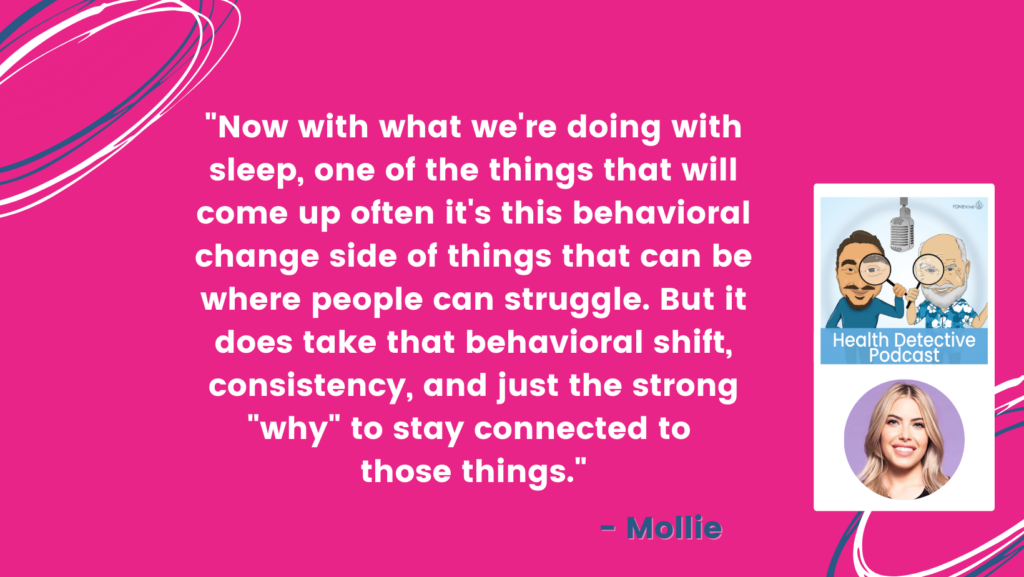
No, it was more in the behavioral space, which landed itself quite nicely. Because now with what we’re doing with sleep, one of the things that will come up (and I’m sure we’ll speak to the many things that people can do wherever they’re at with their sleep to improve it) often it’s this behavioral change side of things that can be where people can struggle. Because often the go-to is, what’s the supplements? What are the gadgets that I can get? What are the bio-hacks? Yet often some of the things that are the least sexy can actually be so powerful. But it does take that behavioral shift, consistency, and just the strong “why” to stay connected to those things. So, it’s been really great to kind of bring that in.
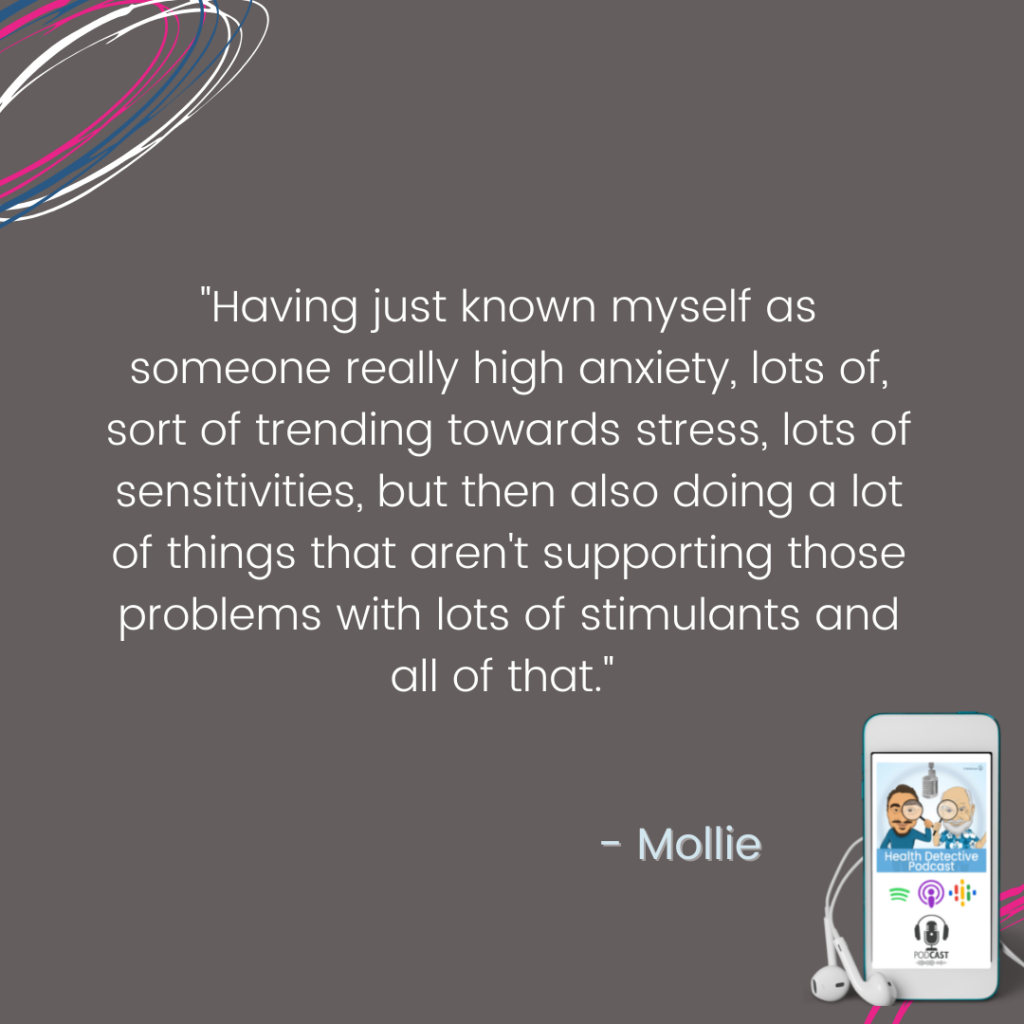
Then, just a real connection to health and wellbeing and kind of personal development for many years. In retrospect, it all makes sense for me with my story. But having just known myself as someone really high anxiety, lots of, sort of trending towards stress, lots of sensitivities, but then also doing a lot of things that aren’t supporting those problems with lots of stimulants and all of that. Seeing that there’s both this interest, but then it honestly wasn’t until I hit that rock bottom period, that really was willing to change everything.
[00:10:17] Detective Ev: I just think it’s cool that we still have that entrepreneurial spirit and we ended up taking it into this type of space and that’s cool. This is what I believe because you know, I dealt with health issues, like I said, from a younger age, but I started looking at what was causing these things. I started to predict that no one in my generation was going to escape this world unless they changed stuff around, because we’re so bad with what we’re doing.
And it’s not their fault. I mean, there’s tons of toxins. We’re adding them left and right. We’re stuck on the blue light all night. I’m like, I don’t think any of my friends, even with the best genes, are going to make it till 40 or 50 without some type of chronic disease. That sounds like, oh, 40 or 50, but guys, I don’t think we should have chronic diseases at 40 or 50.
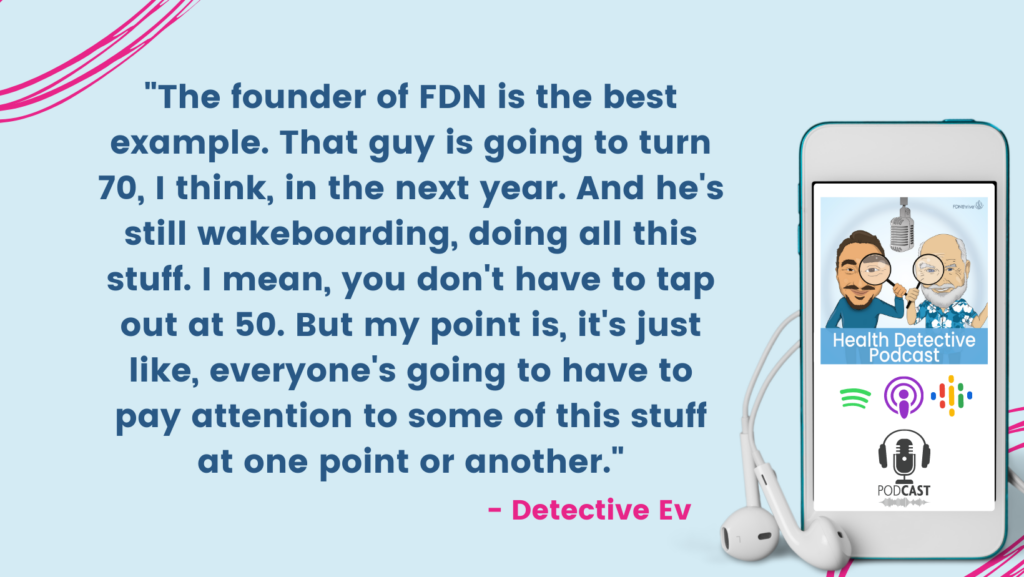
The founder of FDN is the best example. That guy is going to turn 70, I think, in the next year. And he’s still wakeboarding, doing all this stuff. I mean, you don’t have to tap out at 50. But my point is, it’s just like, everyone’s going to have to pay attention to some of this stuff at one point or another. You might make it to 40 and you were able to go party all the time or do whatever.
But truth is, the majority of the people that I went to high school with now in their mid-twenties, you know, even maybe a little older at the late twenties,’ early thirties, they’re all capping out. They’re gaining excessive weight. They’re exhausted. They have anxiety or depression. We’re 25 to 30. It’s like, what happens in the next 10 years?
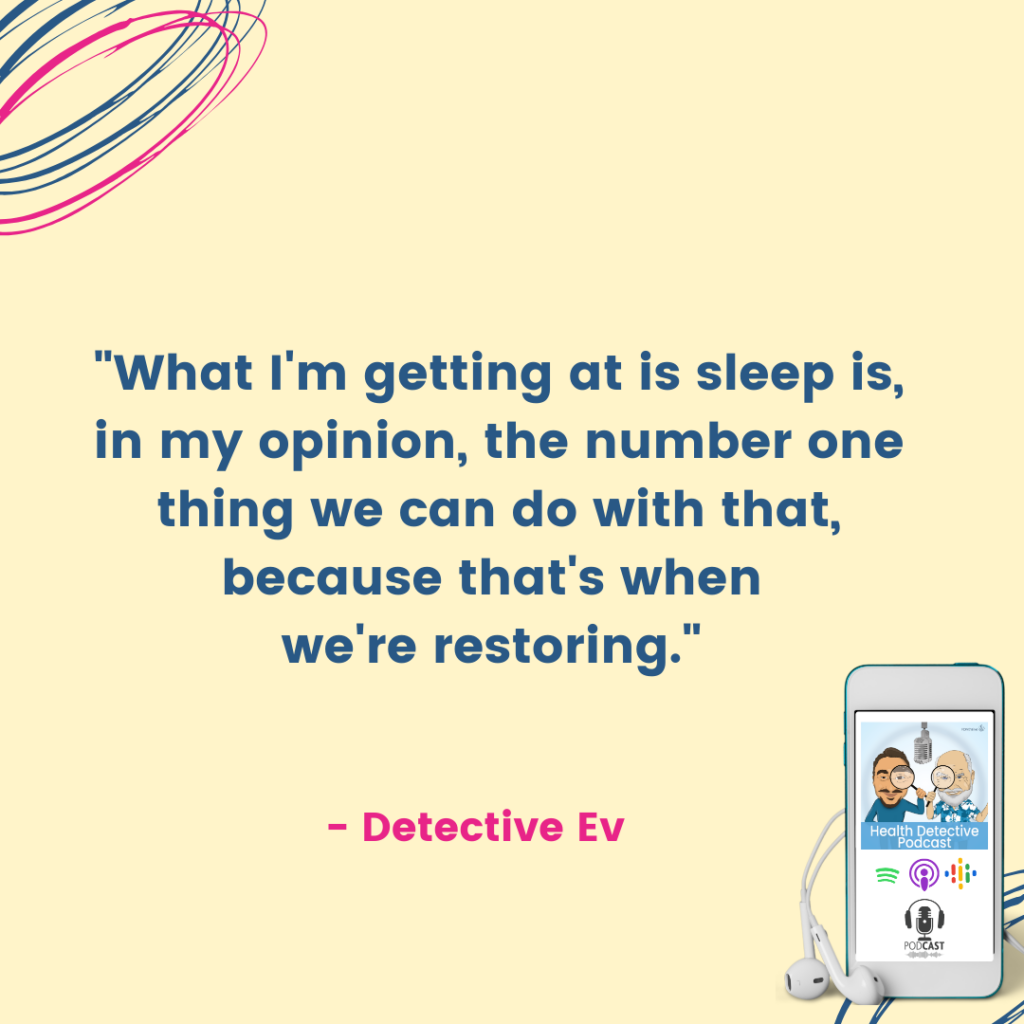
This is supposed to be some of the best times in terms of strength and vitality or whatever. What I’m getting at is sleep is, in my opinion, the number one thing we can do with that, because that’s when we’re restoring. My girlfriend and I went to the gym today. You know, if we don’t rest properly, that was not only useless, we actually just damaged our body. We’d be crappier the next day cause we broke down the muscles.
Where do you even begin with people? Where does this start? Because even when we were talking before, it seems like there’s a lot here. I kinda just want to break it down.
What’s the easy wins for people? Where do you typically start?
Awareness, Commitment, & Key Frameworks
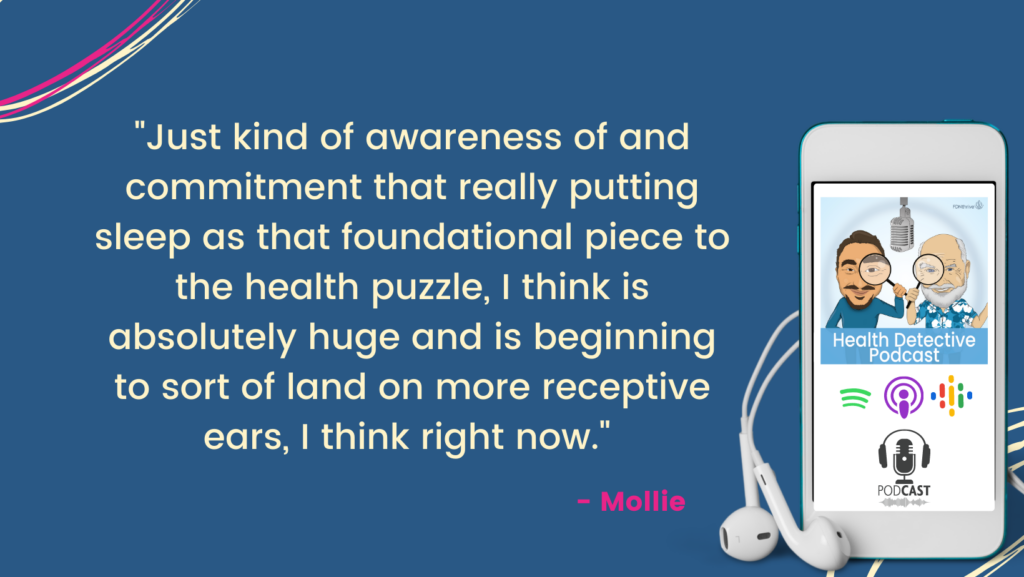
[00:11:59] Mollie: Yeah, great questions. Just kind of awareness of and commitment that really putting sleep as that foundational piece to the health puzzle, I think is absolutely huge and is beginning to sort of land on more receptive ears, I think right now.
And we’ve got more and more studies coming out more and more interest coming out. The sleep industry in and of itself is looking at a real huge uptick in even just the potential amount of money that is available for people. Suddenly you’re seeing so much more of this topic in kind of the mainstream. Whether that’s a good thing or a bad thing, I don’t know, because there’s a lot of things that will be, and we’ll see even way more.
I know more that are coming that are going to be looking for people to invest in this area. But often, it’s really just getting to some of these basics that are often free. Let’s get into some of those. What we do with Sleep Is A Skill is one, just beginning with sort of that “why,” getting connected to even the idea that this conversation or being enrolled in the fact that sleep really could be a skill, which can in and of itself be this paradox because we might imagine that it’s something that’s this innate element to us, and that’s something that everyone can do.
Yet our argument is that in our modern society, we’ve gotten so divorced from some of the things that we had done for thousands of years hardwired on our biology, yet now we’re deviating. From that place, really committing that the more we learn in this area, then the more we can do to both stay on track with our sleep, but also course correct with velocity when we inevitably kind of fall off track. From that place, just kind of coming from that.
Second, we’re very big on tracking. So, we have every person that we’re working with at least wearing the Oura ring, not from like an affiliation perspective, but just from a way to have a consistent objective kind of data points that we can be logging.
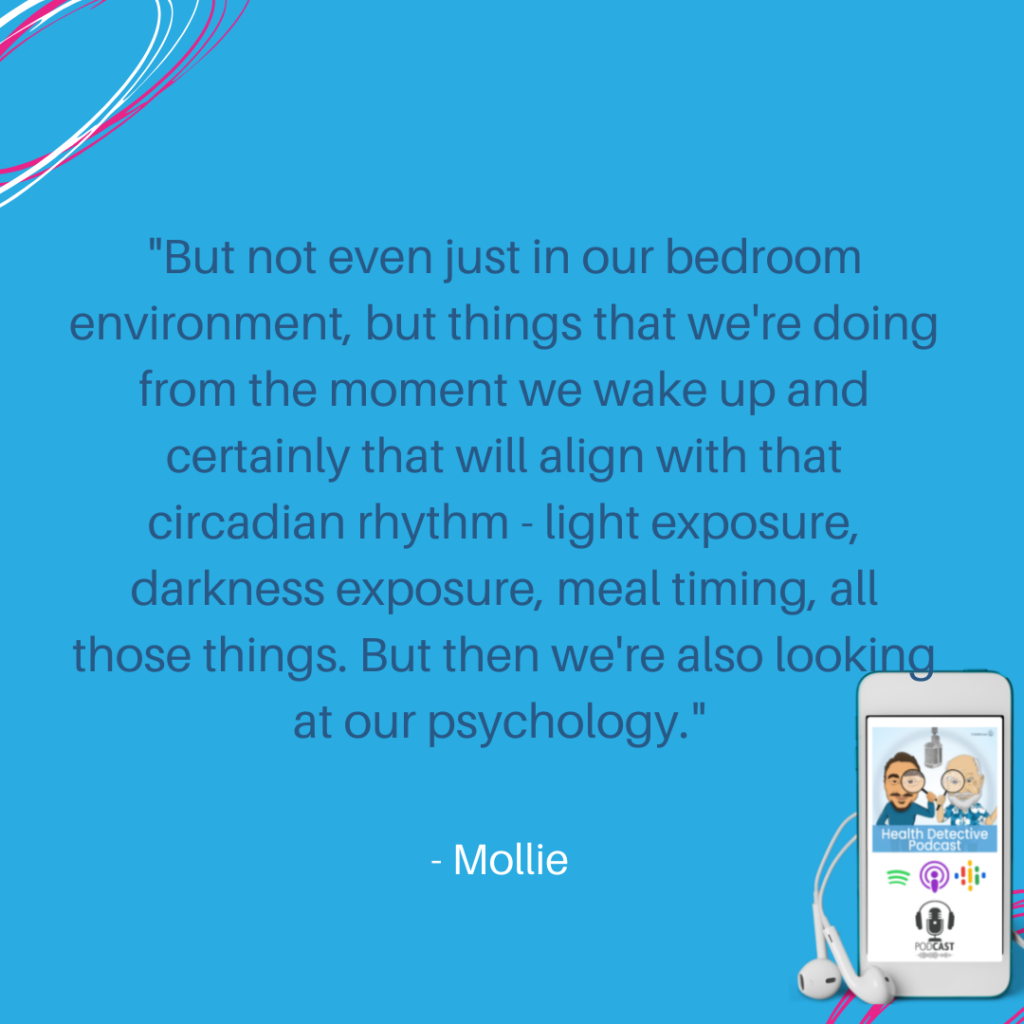
But then too, what we’re looking at are two key frameworks. One being the sleep tripod. We’re looking at having consistency between our environment – our physical sort of environment. But not even just in our bedroom environment, but things that we’re doing from the moment we wake up and certainly that will align with that circadian rhythm – light exposure, darkness exposure, meal timing, all those things. But then we’re also looking at our psychology. Are there either things that are acutely happening that, there’s a death in the family, we lost a job position, et cetera, something acute, or is there chronic sort of stressors from a psychological perspective?
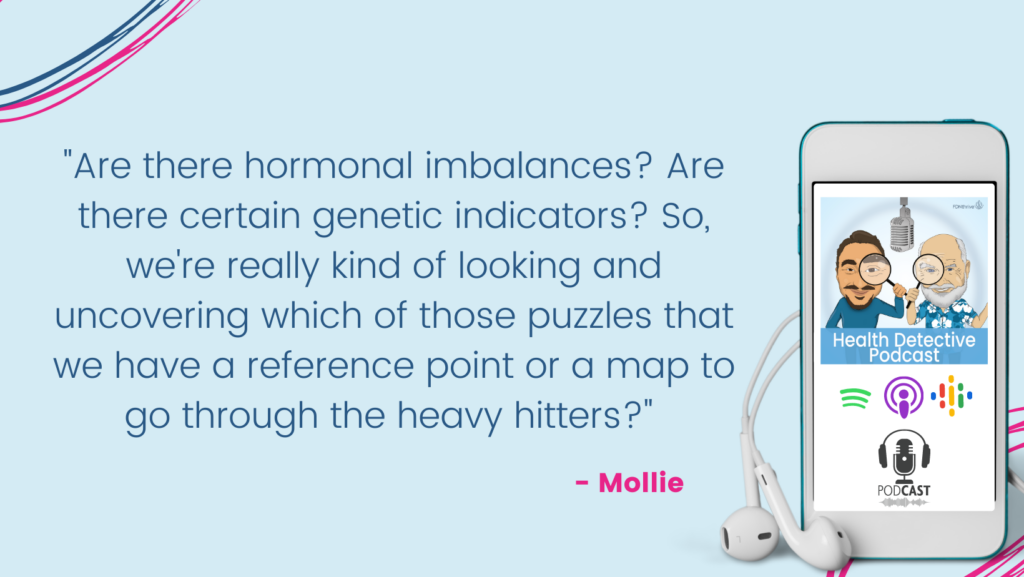
And then third, it’s looking at our physiological health. Are there hormonal imbalances? Are there certain genetic indicators? So, we’re really kind of looking and uncovering which of those puzzles (of course they all work together, but are there some that are more clear than others) that we have a reference point or a map to go through the heavy hitters?
That’s the first framework. Then just the second one, which we can probably spend the most time on is circadian rhythm entrainment. If everyone and their brother was to really just take on this principle and understanding this framework, it could be life-changing for many of us. We can get into some of the things that are involved in that, but all of this is really from this place of understanding that our circadian rhythm, or 24-hour rhythm, is something that exists on a spectrum.
We’re either or might be closer to the weak side of the spectrum or the strong side of the spectrum. I’d make the argument that many of us are kind of probably more closely aligned with the weaker side. We’re looking to move ourselves over systematically to the stronger side.

And what that would look like on the flip side of it is that you’re largely consistently, automatically, without having to think too much about it, going to bed around the same time. You’re waking up at around the same time, eating at around the same time, exercising somewhat around the same time, certainly more closely connected to daylight periods.
You’re looking at your thought patterns and you’ve trained and are working to bring about some of the more stressful things that you might be taking on during those daylight hours. Then having practices so that we can minimize those in the evening. There’s lots of things we can get into, but that’s all within that circadian rhythm entrainment framework.
[00:15:44] Detective Ev: Well, I would love to talk about that. I think it’s fun. Again, I don’t even know how I got into this because it might’ve just been luck and you know how it goes.
You find one article, you’re like, that’s cool. That’s awesome. Then all of a sudden, you’re five years later wearing stupid glasses. This is important though, in this matter. Let’s start it off from the beginning of someone’s day. I mean, what is the first things that they should be doing to really set this circadian rhythm? Because it’s beginning the moment we wake up.
Circadian Rhythm Entrainment
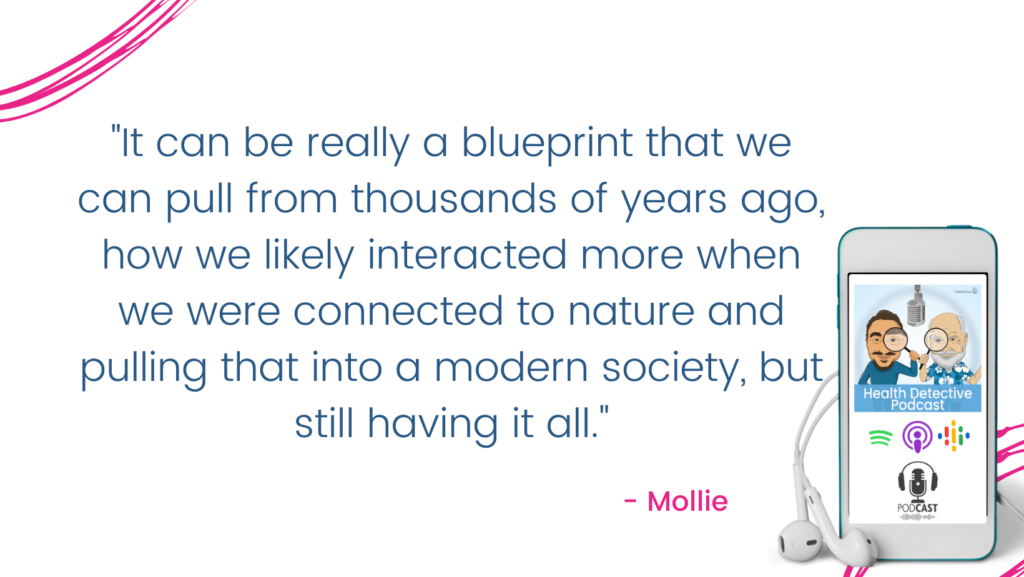
[00:16:05] Mollie: Yes. One, I think speaking to your element, you kind of begin going down this rabbit hole on this topic. I think one of the reasons that this topic can be so fascinating for people, and certainly was for me, once you start learning more and more about it, it can almost speak to this sort of inner knowledge or inner wisdom of, oh yeah, that fits now that I think about it. It can be really a blueprint that we can pull from thousands of years ago, how we likely interacted more when we were connected to nature and pulling that into a modern society, but still having it all. How can we still watch Netflix, but maybe not mess with our melatonin as much and having it all at the same time?
So, first things first, with circadian rhythm entrainment, what we’re looking to do is we have our clients do something called a Circadian Crafted Day. We have them kind of plot out what times they would be inspired really to seven days a week, go to bed and wake up from. When I say that, like that, it’s more that sometimes it can take some time if people have been really extreme night owls to go from that straight, to suddenly they’re rising with the sun and what have you.
So, we might want to kind of ease them into a bit of a shift in their scheduling. And we might have other things that we’re considering, they might be shift workers, they might travel a lot internationally, or whatever might be at play. We have them really look mindfully and responsibly and say, what can they commit to for the time being seven days a week?

Because that’s really the key so that we’re not having, “Oh, well, most of the time I go to bed at this time, except for those two or three other days of the week.” We’re cutting that out. So suddenly you’ve got this Circadian Crafted Day where you have a consistent bedtime and wake time. Then from that place, you’re looking to not deviate too much between with the deviation kind of shift of 30 minutes or so on either side – so plus, or minus 30 minutes. Sometimes, something comes up, you might go into the 40, 45-minute range, but we’re looking to have it be as close as possible. Coming from that consistent place, then you’re starting to bring in what are these zeitgebers, which is really another term for time givers that affect your circadian rhythm.
Importance of Light & Darkness
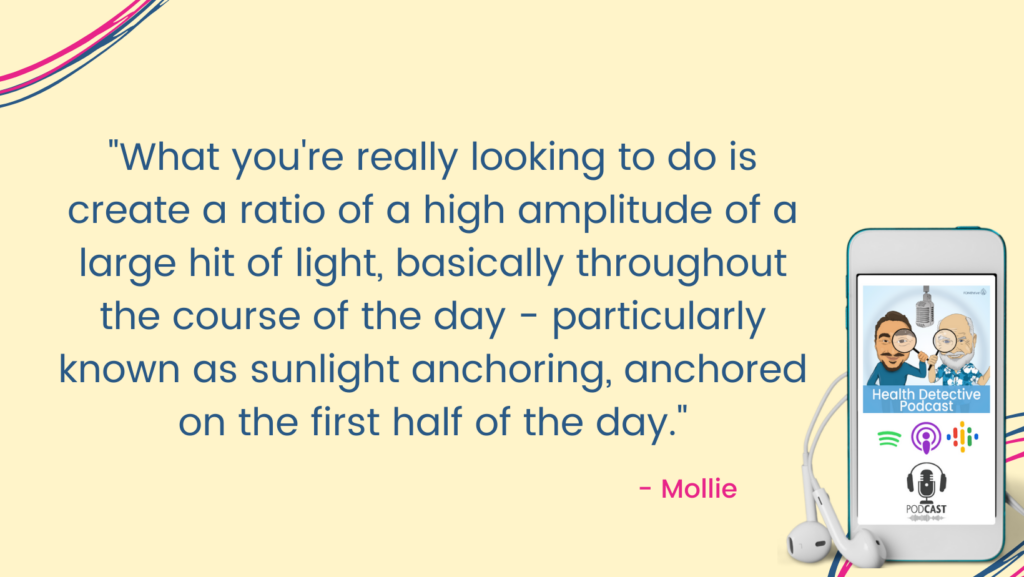
The first one is light and that is by far one of the most powerful time givers that we have. That is the first one that we want to look at. From that place, then what you’re really looking to do is create a ratio of a high amplitude of a large hit of light, basically throughout the course of the day – particularly known as sunlight anchoring, anchored on the first half of the day.

Then on the flip side of that (we can’t talk about light without talking about darkness) is that then you want to augment your amount of darkness that you’re getting in the evening. Kind of going from dim to total darkness, of course, when we’re asleep, and having those interplay well.
Now what that would look like in your day is you have your set wake up time, and then you’re going outside physically each morning as closely, you know, kind of married to that, wake up time as possible. That you’re going outside and getting that sunlight in your eyes specifically without sort of baseball hats, scarves, because you also want to aim to get it as much on your skin as possible, vitamin D.
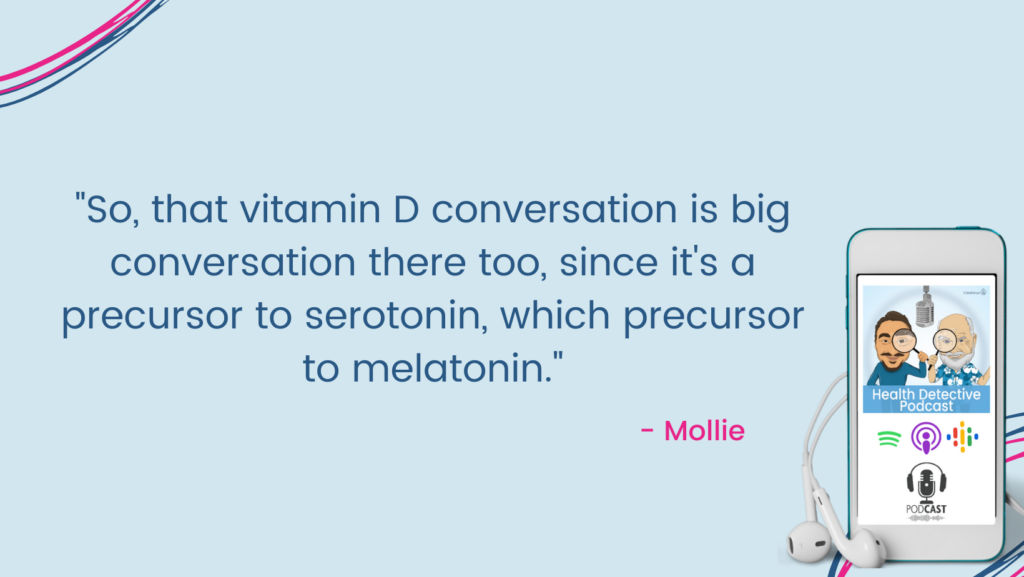
So, that vitamin D conversation is big conversation there too, since it’s a precursor to serotonin, which precursor to melatonin. That’s all going to be a part of this conversation. You want to prioritize that process in your day. Of course, it depends on where you might be on the globe.
If you’re in a Northern location, then you might need to actually find yourself being out there much longer versus, I have a lot of clients that say whatever they’re in, I don’t know, Canada. And they’ll say, well, listen, it’s December in Canada, so I’m not gonna necessarily be out. It’s just, the sun is weak, it’s cloudy, why bother? And actually, we want to do the opposite and extend the amount of time that we’re connected to that sun to actually begin to get enough of that hit of that rewiring – resetting of your master clock.
This is all connected to your suprachiasmatic nucleus, which is directly connected with your eyes. This is that process by which when the light comes in, it tells us how to stay on time. You’re consistently doing that. If you get nothing else out of what I’m saying, my hope is that at least this practice is something that we can bring in and it’s totally free. If for some reason you’re bedridden or something’s come up that you can’t get outside, that is a time when you can look at different alternatives.
Helpful Alternatives & Starting Somewhere
There are some light boxes on the market that actually can help. The Sperti lamp is one that has FDA clearance to help uptick vitamin D production. Those are some things, but those are definitely lower on the rung to getting full spectrum sunlight each day. That is part of our goal.
And then I can get into some of the other ones too, if you’d like to kind of go down.
[00:20:41] Detective Ev: Well, there’s so much to hit on there. I know even the one doctor I follow, and it’s a good recommendation, if the person is, God forbid, bedridden. And this is relevant because some people that we’re talking to, especially here, are so damn sick that they just can’t do much.

You know, guys, don’t underestimate the ability to just open up a window and face east in the morning. Is it going to be as profound as walking out there for 30 minutes, an hour? Of course not. But start somewhere. Most people have never even really experienced what it’s like to see that as first light, unless they’re camping. Certainly not in the last five to 10 years.
What do we do immediately? We go to our phone; we’re getting the brightest light ever. It’s just, it’s messing up our body from the second that we wake up. Yeah, I’ve done a lot of experiments with this. This would sound crazy to anyone else, even in the functional world, but not you. In the beginning of the pandemic, obviously that started in March kind of that’s when the lockdowns began. I use this as an opportunity in June to do something I wanted to do forever, but never had an opportunity to do. I camped outside for 60 days straight. The only exception was about seven or eight days. It was thunder storming.
It was in a field, stupid. I’m not trying to be a hero here. I was just trying to see what happened. I would spend around the first, two, three hours in the morning, I’m exposed to as much light as possible. Again, it sounds ridiculous, but I’d be out there, boxers or shorts. I wanted to take it to the extreme to see how much better I could feel. Mollie, I was recovering from workouts that would normally take me 72 hours, in 24.
I didn’t change my diet. I didn’t do anything like that. In fact, I actually worsened the diet a little bit because it felt like I was getting so much better. I’m like, is diet, how important really is that when I’m doing this correctly? And I’m just getting more and more. I’m out for an hour in the middle of the day, I wasn’t burning, and you can tell I’m not a particularly tan person.
I got tanner, but I only get so dark. I wasn’t burning no matter how long I stayed out. I slept like a baby. What was crazier is in the summer, since around here in Pennsylvania, I mean the last light might be seen at 9:45 in July, PM. And the first light might be seen at 4:45, 5:00. I’m only sleeping some nights, six hours, which I hate doing normally. And I felt like Superman the next day still. I felt amazing. I noticed in the winter now, because I follow my sunrise stuff, but we were just out today hiking for about an hour in the sunrise – I will sleep for nine hours. I change with the seasons and with the light because I’m actually following the light. I don’t want to make it too much about my experience with this, it’s just hard. Yeah, I have a bias with this cause I love this topic.
How Much Morning Light?
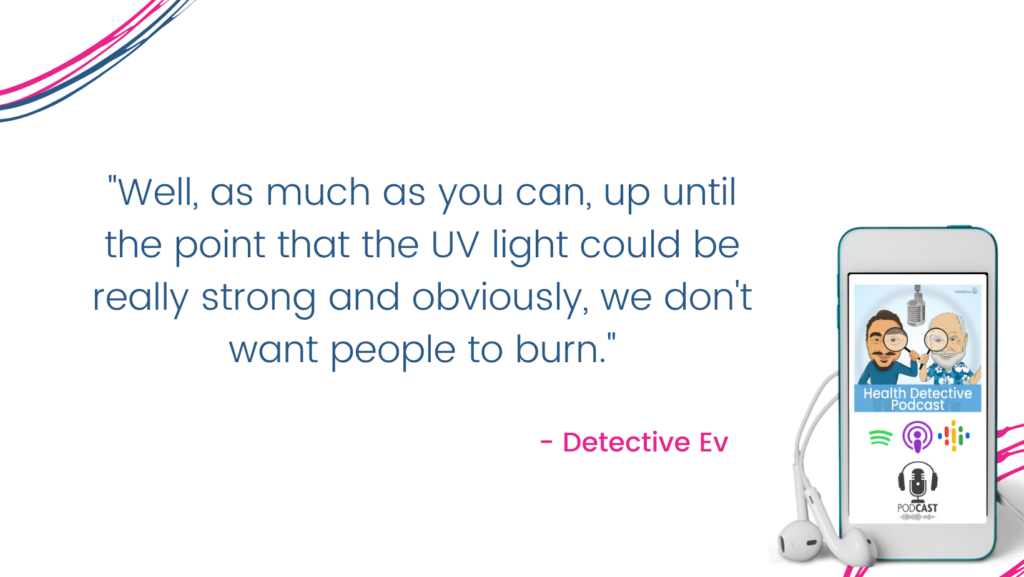
But yeah, guys, it’s like people always ask, how much morning light should you get. Well, as much as you can, up until the point that the UV light could be really strong and obviously, we don’t want people to burn. But for most places that you live on earth, I mean, it’s going to take two to three hours before any amount of strong UV light’s even coming in. Here, you know, for the last two months, we haven’t been able to get any meaningful amount of UVB through the atmosphere.
So, it’s like that, you know what I mean? And people underestimate this. I also know that people will want to know some objective thing, cause they’re going to be like, Ev, I can’t be out for three hours like you were in the summer. And you know what, neither can I. So, Mollie, what is your recommendation? Like a bare minimum type of thing.
Hey, you know, I’m sold on that. I’ll go out and catch morning light. I think that makes sense. She seems like she knows a lot about this stuff. How long are you recommending people stay out for?
[00:23:34] Mollie: Yeah, really good questions. And too, I love that story. We’ll have to chat more or maybe offline, or what have you, about the camping experience, cause that sounds incredible.
Also, if anyone wants to follow up on kind of different studies in alignment with that, there’s a great University of Colorado study that was done bringing in groups of people that were self-proclaimed sort of night owls, taking them camping basically for extended periods of time.
Really kind of quickly, within a few days there began to be meaningful shifts where they start to just align with the rhythms of nature. They’re starting to go to bed closer to when the sun is setting. There’s no other distractions, it’s total darkness at night and then total brightness in the morning. And they really start to entrain, which is exactly what we’re talking about. There’s so much we can do from an environmental, behavioral perspective. I think that’s really, really key.

Next, as far as this topic of how long to be out there. What I do from a behavioral standpoint is I even have people just begin with five minutes. Now, this is just from a place of beginning to make this a habit and to feel like you have some wins.
The other thing I would put in too is there’s absolutely benefits and there’s great studies looking at hospital stays – length of stays where patients are close to windows and their ability to then heal presumably with velocity and then being able to be let out sooner than people that are without a window in their space. So there seems to really be benefits behind a window.
At the same time, there’s also studies looking at, it could still take anywhere from 50 to a hundred times longer to reset your master clock from behind a window. If that’s all you can do, fantastic. That’s great. Open up those blinds, do all that you can to make it as bright in your environment. But ideally getting outside is going to make that difference because it’s just that unadulterated light. We want to get that full spectrum light if possible. Starting with those five minutes can be really great.
Then we want to start kind of from that place over time, kind of creeping that up, ideally. Now it is dependent on where you are on the globe, as we were speaking to, and it is dependent on the strength of the sun, at what time you might be at. So later, after my issue with my whole sleep and the Tim Ferriss thing, we did actually then travel for around three years, digital nomad style.
We went to a lot of Southeast Asia, a lot of Thailand, a lot of like close to the equator living. So, there would be times when the sun could be very, very bright, very, very strong, depending on the times that you might be out there. But we all want to do this largely before 10:00 AM if we’re giving some blanket sort of parameters. So, getting that, but certainly ideally very, very close to when you’re waking up and hopefully it’s in alignment with the rhythms of nature.
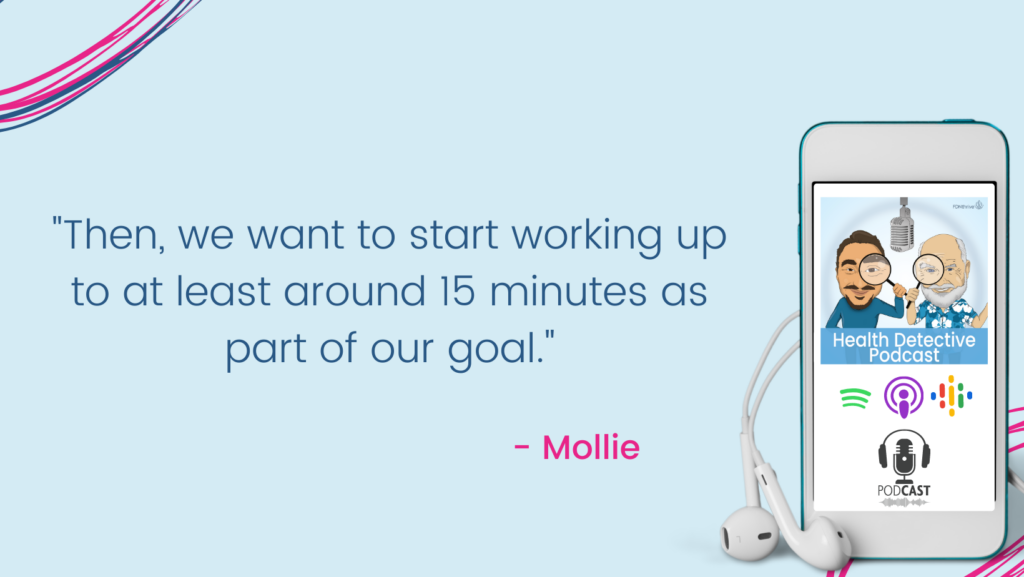
Then, we want to start working up to at least around 15 minutes as part of our goal. But there is an averaging effect that can come out. I don’t want people to think that they’re not doing well or give it up if they can’t get in all of that time. Because even if some days you can only get a couple minutes, that’s still going to help with that sort of averaging effect. Then some days you have a little bit more flexibility in your schedule, you stay out a little bit longer.
But I will call out too, I do work with a lot of clients that are in places like Sweden or Alaska or times when it’s just total darkness for periods of time or total brightness. That’s when you might want to lean into creating a faux kinda light/dark cycle for yourself. Also shift workers. I work with a lot of poker players that kind of do the same thing. So, you can create that faux kind of rising and setting of the sun yourself inside, if you must.
Moving Toward the Poles or Near the 37th Parallel?
[00:26:46] Detective Ev: I got to ask, I mean, this is totally, it’s not off topic, but it’s not necessarily important to the conversation, but hopefully people find it interesting. What do you think about the Alaska thing? Because I wonder, knowing the benefits of circadian rhythm entrainment now, I’m like, were humans supposed to be living there? Cause that seems pretty counterproductive.

Now, most people don’t realize that every part of this earth actually gets the same amount of sun. You know, throughout the year it’s just completely shifted differently. You have the equator where it’s damn near perfect half and half, and then you have the opposite extremes like Alaska or whatever.
But I sometimes wonder, I mean, I feel like, knowing what I know and what the studies are showing, that would throw us so off. I just can’t understand how a human being was supposed to be in that environment. So just sort of totally side note, what do you think about that? Do you think we’re supposed to live there? Does that make sense?
[00:27:26] Mollie: I can tell you, I just came back from Austin, Texas just yesterday cause we’re moving there. And in Vegas right now with a lot of the poker player conversation, but kind of tons of sunlight. I’ve really set up my life to be able to quote, unquote “chase the sun,” was actually an interesting book. If you haven’t heard of that one called Chasing The Sun. Because of so much of the information that is coming out around some of the benefits of being able to be kind of basking in more of that sunlight, when possible.
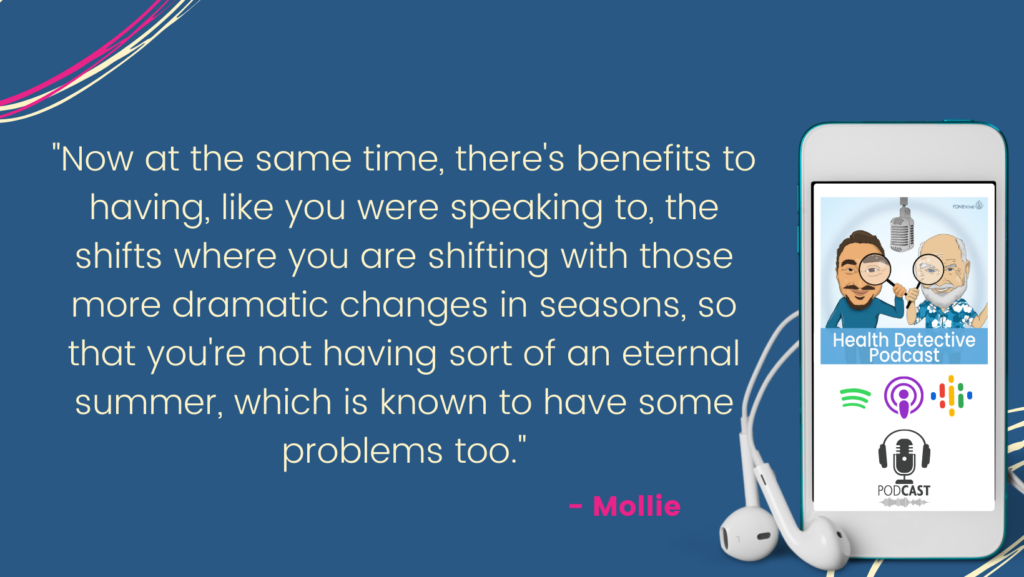
Now at the same time, there’s benefits to having, like you were speaking to, the shifts where you are shifting with those more dramatic changes in seasons, so that you’re not having sort of an eternal summer, which is known to have some problems too. Cause we don’t want to have too much sunlight because that can kind of create a lot of changes in behavior as well. We want to have sort of this nice marriage.

But I will say there’s some interesting information around the 37th parallel it’s called. So, anything above the 37th parallel, for instance, things like MS rates being really markedly higher, the further you’re going from this 37th parallel. Then if you’re going south of that 37th parallel there seem to be some beneficial health benefits. And since for me, health is so crucial, and also this relates to not even just physical health, but for me, I’m really passionate about the mental health side of things. I shared about the anxiety issues and all of that. Seeing just how much of a difference this can make, it just feels like a no-brainer to relocate, if it’s possible.
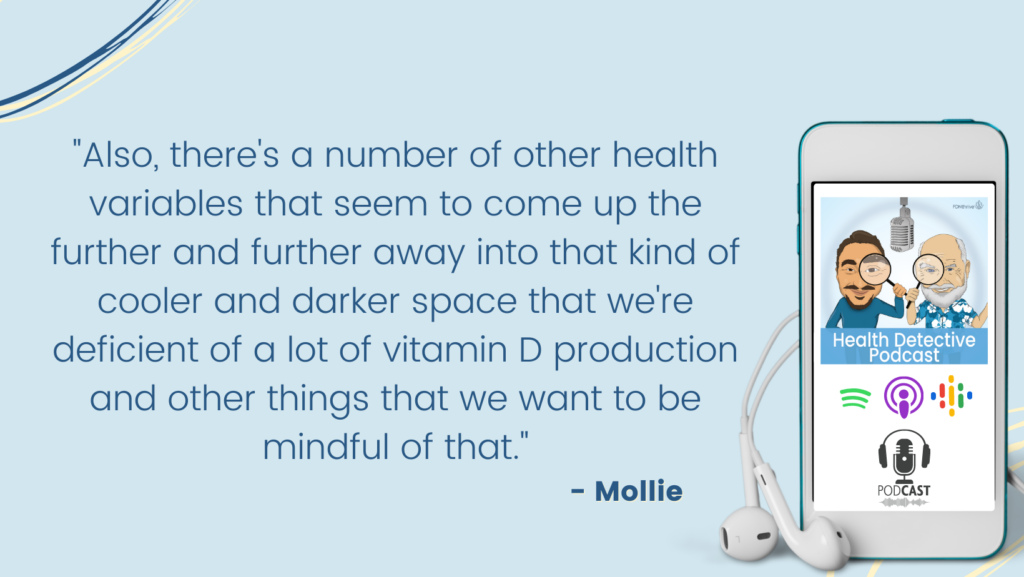
I know that’s not possible for everyone, but if we can prioritize that, then there seems to be a real difference. Also, there’s a number of other health variables that seem to come up the further and further away into that kind of cooler and darker space that we’re deficient of a lot of vitamin D production and other things that we want to be mindful of that.
[00:29:10] Detective Ev: Okay. That’s a great answer. Obviously well thought out because that’s the position that I’m in, where I really do believe if someone is super sick now and nothing else has worked, I would move. Like, I’ll put it that way. If it was me, I would move. Like you’re in Austin, Texas now, or soon to be, I think.
Mollie: Yeah.
Detective Ev: That’s great.
Yeah, Deerfield Beach area, little north of Fort Lauderdale in Florida, that’s going to stay really warm year-round too. Even in January the high is like 78. It’s a good place to be. It’s easy to get out. And you know, it doesn’t matter as much if you’re able to be outside all of the time.

Sleep According to Career Field
Like I think if you’re a garbage truck driver or a landscaper or a construction worker, those are some of the best jobs for this type of stuff, if you know what to do properly, and you’re not wearing sunglasses all day. I get so upset when I see these guys and girls that are out there and I’m like, oh, no, like you’re so close. All you had to do was take those off.
But the perfect anecdotal experience with this is my dad. My dad was the least sick person in our immediate family. Dad, though, had the worst habits, apparently. Smokes two packs a day still to this day, Mollie, of the one hundreds. I mean that dude, you can measure the hours that he has a cigarette in his mouth every single day. He ain’t stopping any time soon. He said, if I could smoke in my sleep, I would. I don’t think that’s in the Sleep Skills business, but that’s his thing. But you can’t argue the guy because he’s healthy as a horse.
He gets his stress test; they tell me he has a heart of a 25-year-old. He’s in his fifties, this was just a couple of years ago. The most impressive thing that’s probably happened is he got COVID, and he was asymptomatic within 12 hours. I’m like, wow, but this guy doesn’t even look related to me. He is so dark. He almost looks like from Latin America.
He’s just that dark because he’s been a landscaper since he was 17. From 17 until almost 50, he worked seven days a week. He took off one vacation. He took off the rain days and stuff. The rest of the time, he was a seven-days-a-week guy. And what was he doing? Waking up with the sunrise. Yes, smoking a cigarette, but also waking up with sunrise.
Yes. Works all day, comes home, goes to bed at nine o’clock. Didn’t even realize he was doing the best thing possible. So, would I make the argument off one anecdotal experience? No, but damn, it’s kind of hard to argue this stuff when you see a guy that eats pizza, drinks soda, smokes two packs of cigarettes, but never really wears sunglasses, has that darkness.
I’m sure his vitamin D status is through the roof. And look at him, go. I mean, he’s running around. No problem.
[00:31:24] Mollie Absolutely. Yeah, there was a release of a stats of different industries and what their sleep looks like. Now this one was a while back and I’ll be curious to see if anything changes here. But there was a period where people in the forestry industries, so forest Rangers, and what have you, had some of the best sleep, total sleep time. We don’t know about quality or what have you, but interesting and noteworthy of that outdoor exposure.
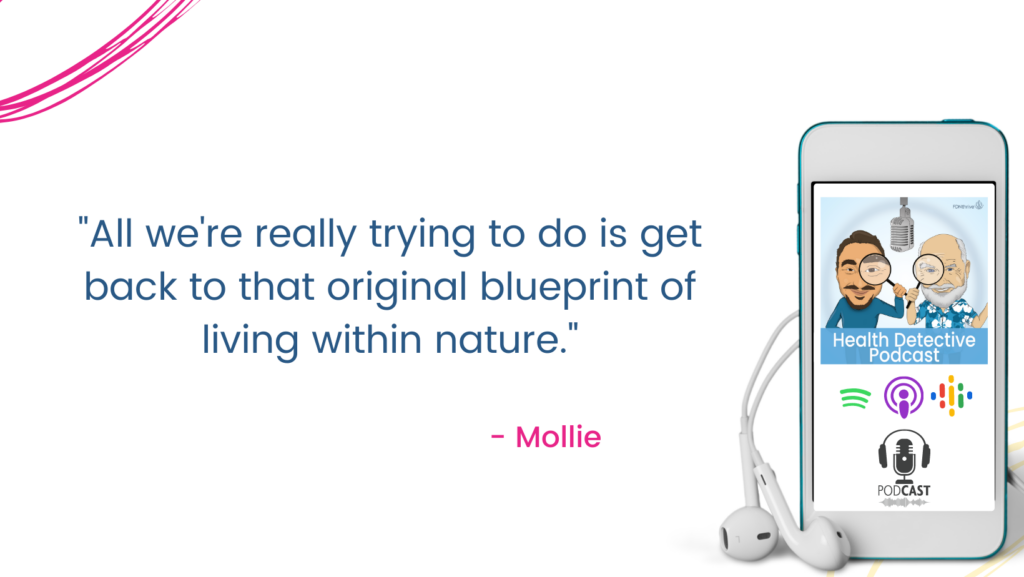
If we’re being really simple about this, everything we’re talking about is really (even though we’ll talk about kind of fancy language for it and bio-hacks, and all of these things), all we’re really trying to do is get back to that original blueprint of living within nature. But we’re still trying to do it and still have our other fun gadgets and gizmos in the midst.
Importance of Temperature
But at the same time really, if you simplify it, like coming back to the second down on the rung for circadian rhythm entrainment’s temperature. We talk about light; we talk about darkness, and then temperature.

One of the things that you could even argue for one of the modern-day gadgets is still aligned with these rhythms of nature, like a cooling mattress pad, like a chilly pad, or an Eight mattress, or any of those. Some of the theories as to the “why” that that would be beneficial is if we’re outside sleeping in nature, we would have been likely close to the ground, which is, you know, this coolest spot that you can be at throughout the entire course of the night.
The thinking is that something like those cooling mattress pads, while seeming so new-fangled and like next level, is really just kind of reconnecting us more to how things would have been. There’s even another theory where pulling hides for a blanket in the past, or heavy things put on us, like furs, that could be more akin to weighted blankets. Is that still part of our DNA? All of this is like, instead of thinking, oh my God, we’re so coddled now and why do we need all these extra things to sleep? The flip side could really be that all we’re looking to do is be a bit more in alignment with how things were when we were just aligned with sunrise and sunset and living within those elements.
[00:33:22] Detective Ev: I always explain this, especially to younger people, because my friends respect it. They know that this worked for me. But sometimes like high school ones can be confused about it. I’m like, guys, our seeming advancements in technology is actually leading to our human regression. I mean, we’re getting sicker. It’s objectively not working.
The life expectancy of my generation is summated less for the first time in recorded history. Now here’s the thing. Western medicine is getting better by the day. It’d be bad if the life expectancy was staying the same, in theory, you would think. I mean, I’m sure humans have a cap. But if it was staying the same while Western medicine is getting better, that already implies that we’re kind of doing something wrong. If it’s getting worse, that’s a huge issue. There’s a real discrepancy here and we’re really messing up.
It’s so clear that you are absolutely, no doubt, the most educated person that we’ve had on the podcast about this topic. I appreciate you coming on. I want to just rattle off a few questions that is not necessarily like on track with what we were doing, but it’s important none the less. Melatonin supplementation. Do you think there’s a time and place for that? Do you think that’s something that shouldn’t be used? Because I hear this back and forth, it annoys the heck out of me. I will admit this is probably the one I’m most confused with, so I like to ask people. Really the question is, does it ever have a place? And then when would that be, if so?
Where Does Melatonin Fit?
[00:34:30] Mollie: Oh, yeah, it’s a really good question because there are a lot of kind of conflicting, I call them different camps. There’s two camps sort of the pro melatonin and not even just necessarily pro melatonin, but there can even be high dosing melatonin strategies that people are leaning into and suppositories and all kinds of things.
It seemed to have some valid studies around it. Even looking at things like cancer and some of the benefits that might be available for people with high dosing melatonin, and also with sleep disorders. If people are dealing with certain REM based disorders or lots of other sleep issues that we’re challenged to address naturally or behaviorally, then that could be another approach that people might lean into.
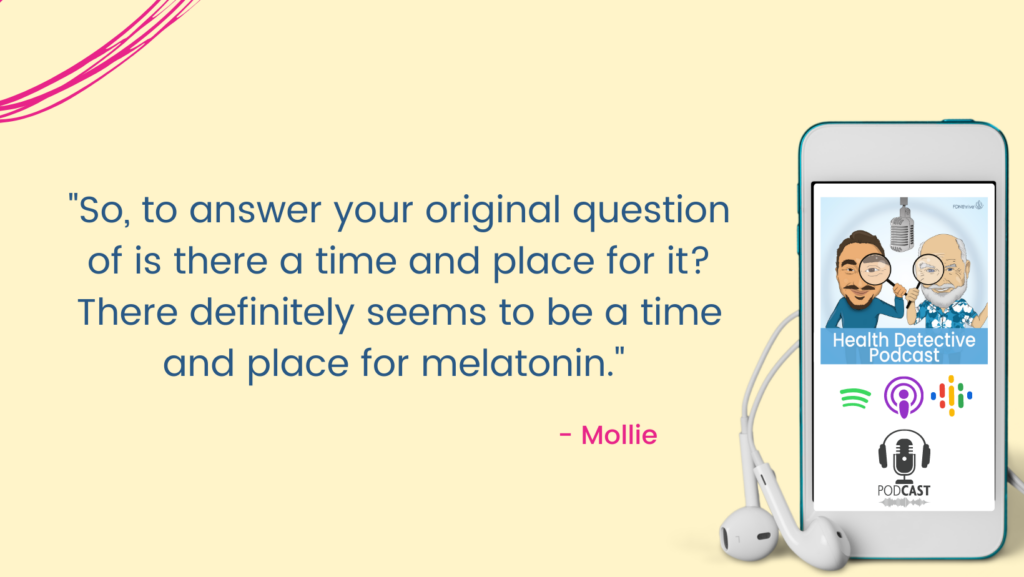
So, to answer your original question of is there a time and place for it? There definitely seems to be a time and place for melatonin. Those would be some of those things that seem to have some validity.

The other group then, which I find myself much more being in alignment with, which is having reverence for the fact that melatonin is a really interesting thing to point to because one, it’s a hormone. I think there should be reverence for anytime we’re starting to truly have hormone replacement therapy, if you will, even though we see it on so many of our shelves and very casually marketed often, even in kids’ cold medicines, and making it really a casual thing. But do remember that in different countries, you have to actually, in some of those countries, get prescriptions in order to get melatonin. Yeah. There are certain countries that have that. That is a really important kind of call out that we’re not necessarily the only spaces that are so casual about the fact of having melatonin.
Creating Melatonin Organically
Secondly, if you are going to be leaning into taking something like this, we do want to first look at all of the behavioral shifts that you can make to uptake your own production of melatonin. Because also while it is this hormone, it’s also one of our most potent antioxidants at the very same time. So, it’s kind of like vitamin D how it’s like a vitamin and hormone. Does all these things – the superpower.
So, we want to do as much as possible to create our own melatonin production, cause then there was the concern of if we are to be taking this externally, could that impede our body’s own ability to produce that? I don’t think we have enough of that kind of clear studies. Now people go back and forth on this topic, but I still am wary of this, especially if there’s so much we can do to improve this naturally.
NASA Involved in Study
Now one really cool study NASA was actually a part of, because they have invested interest in helping their astronauts stay on time throughout the time where they’re shuttling through space. In some points, it might be sun rising and setting every 90 minutes or so when they’re kind of, ushering through space. It’s really crucial for their own physical and mental wellbeing to stay on circadian rhythm, really cleanly.
So, with that, this study looked at the difference between static lighting, which is the same type of lighting throughout the entire course of the day (so say they had that on the shuttle or space missions, having that same type of lighting the entire time), or having dynamic lighting, where it adjusts sort of like a circadian rhythm centric lighting. What they found is that with static lighting, there was this little uptick in natural melatonin production, but it was a little blip.
Whereas with dynamic lighting, it was this measurable big old Everest peak of naturally produced melatonin. We have to remember that melatonin is known as the vampire hormone or the hormone of darkness. In order to create your own melatonin naturally and sufficiently, cause you might get a little blip but to really get bathed in that melatonin, then it’s important for you to really value darkness.
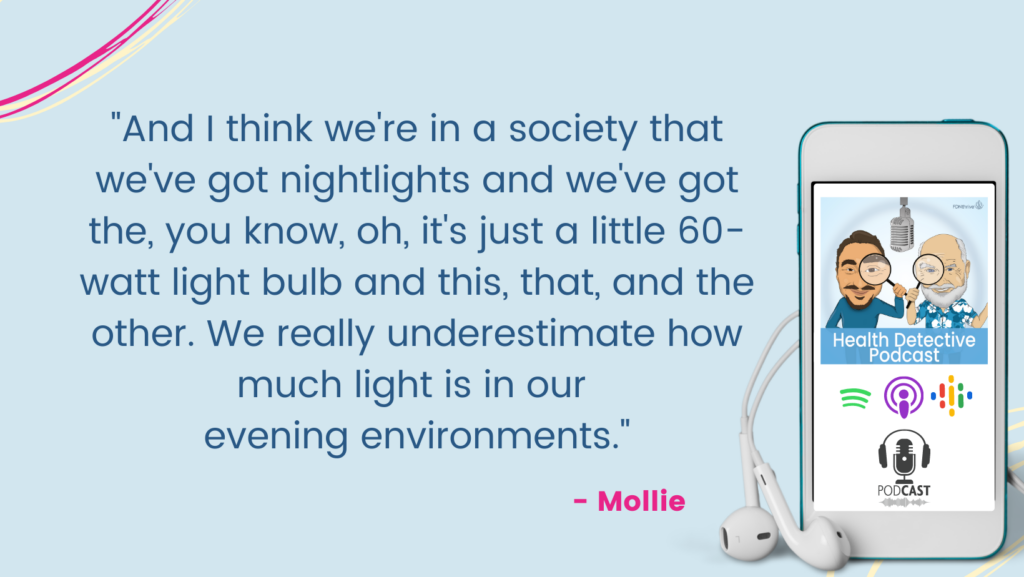
And I think we’re in a society that we’ve got nightlights and we’ve got the, you know, oh, it’s just a little 60-watt light bulb and this, that, and the other. We really underestimate how much light is in our evening environments. When we do move that down, I just see this time and time again, where clients send pictures, they send video of their sleep environment, what have you, and as we start to just get rid of a lot of those extra lights in the evening, they’ll just always say, not only themselves but the rest of the family, is often getting tired earlier. It’s almost as if like, oh, I can’t believe it, that’s so weird. But it is not. It is so clearly wired in our biology.
Melatonin Use with Stress and Traveling
[00:38:32] Detective Ev: Again, we might have to just have your back on. I mean, you thrown down so much stuff. But the one melatonin thing that you’d never hear anyone say is that, you think, hey, maybe logically, this would make sense. It is a hormone that if we overuse this or use it too much, we might not be able to produce as much. But everyone says that like it’s a fact.
And I fell for that as well. There are no good studies yet showing that use of melatonin inhibits your natural response. In fact, there’s actually, I didn’t believe this, there was some showing the opposite. Like people that are sick, it might actually trigger a normal response. When I figured that out, and that was only a year and a half ago, that got me on the train of like, I wanted to experiment with this. And, you know, I believe I’ve actually probably overdone it a little bit because I use it at times under stress.
I’ve been under stress because of the last two years, you know. I think I take on this state of the world a lot more than I realized, and I’m sure that’s true for many people. But it has had an effect on me. I saw things coming back, very minorly, thankfully – skin stuff or just depressive like symptoms, things that I had not dealt with in four or five years, seem to be coming back and admittedly are still a little present. So, I’m working through that.
But the melatonin thing for me, now I use it when I’m traveling just frequently enough. No, that I’m pretty confident with that that’s helping me. And I love the extended-release stuff. Most people are taking like a blast of three to 10 milligrams. I like, you know, 1.5 to three extended-release over six hours. That feels really good. I wake up very alert and yeah, it might not be my normal sleep at home. But yes, I do feel good for traveling, especially, and it’s not messing me up.
Because you know how it is if you’re living this lifestyle, you just said that you were traveling yesterday. Now, you’re on a podcast. You got to show up and be your best self. That’s why it’s important to me. The other thing I’m interested in I’ve never even asked on the show, cause I don’t know anyone that’s familiar with it, but you might be. There was a meta-analysis done with studies that contain both humans and animals showing that exposure to EMFs that were about 50 to 60 Hertz actually lowered melatonin. Are you familiar with this?
EMF Effects on Melatonin
[00:40:20] Mollie: Yes. A couple of things. We do a lot with Sleep Is A Skill on the topic of EMFs now, it is a controversial topic.
With that kind of asterix calling out that absolutely doing due diligence to shift the amount of EMFs in our space and certainly while we’re sleeping, seems to have some pretty solid information behind it. Now, sometimes you do have to go out of country to get more of these studies. That’s like a longer topic on the “why” and all of that.
I know we were mentioning Ben Greenfield. I think he was someone that’s pointed to, even if there is a lot of this controversial conversation and counter information coming out, that even from that place, what would be the harm to very much minimizing the amount of just extra things that are in your sleep environment, certainly for at least, you know, those seven to nine hours or so that you might be in that.

Then even looking at what would be the harm in potentially minimizing some of those things you’re exposed to throughout the course of the day where possible. Absolutely there seems to be some effects where we’re looking at melatonin and how that plays a role. Cause certainly if we’re talking about antioxidant, our ability to kind of heal throughout the course of the night, then having that impeded would be very counterproductive, especially to a lot of the clients I’m working with that are high performers. They’re looking to kind of squeeze every inch out of their ability to recover and what have you. And if we are impeding that, there’s really just no reason for it.
[00:41:40] Detective Ev: Like you said, I mean, there are the studies things, the whole episode in and of itself. But that was one of the most solid ones that I had seen.
I love when I can find something, I’m like, okay, some meta-analysis done with both humans and animals. I like that. There’s something here. Because the question I was looking for, or to answer at that time was just do EMFs have an effect? Because people will still act like that’s tinfoil hat stuff.
Again, it just, it drives me crazy sometimes. How is this? There’s clearly studies showing this has an effect. I didn’t say it’s the worst thing in the world. If it was really the worst thing in the world, I’m an hour away from Philadelphia, those people are bombarded. They’d be dropping dead in the street compared to what I’m in, if it was that, that bad. But obviously it’s doing something. So, you know, we don’t have to be tinfoil hat. We don’t have to be crazy. Like yes, we’re affecting us. And, you know, people also forget that the sun by definition is its own form of radiation.
If you know, it’s part of this EMF spectrum. We know how much that benefits us. That’s a very, very small portion. Well, I shouldn’t say the sun in general, visible light is a very small portion of the actual electromagnetic spectrum. I think it’s probably fair to say that it’s effecting us in different ways.
It drives me crazy that that’s a side point. I want to make sure that we get in our signature question on the podcast, as well as where people can find you. One other thing I want to throw out real quick, because you alluded to it in the beginning. I don’t think this is talked about nearly enough is meal timing and its effects on circadian rhythm.
Meal Timing’s Effect
What’s the one researcher’s last name? Is it Panda?
[00:42:57] Mollie: Oh yeah, Satchin Panda.
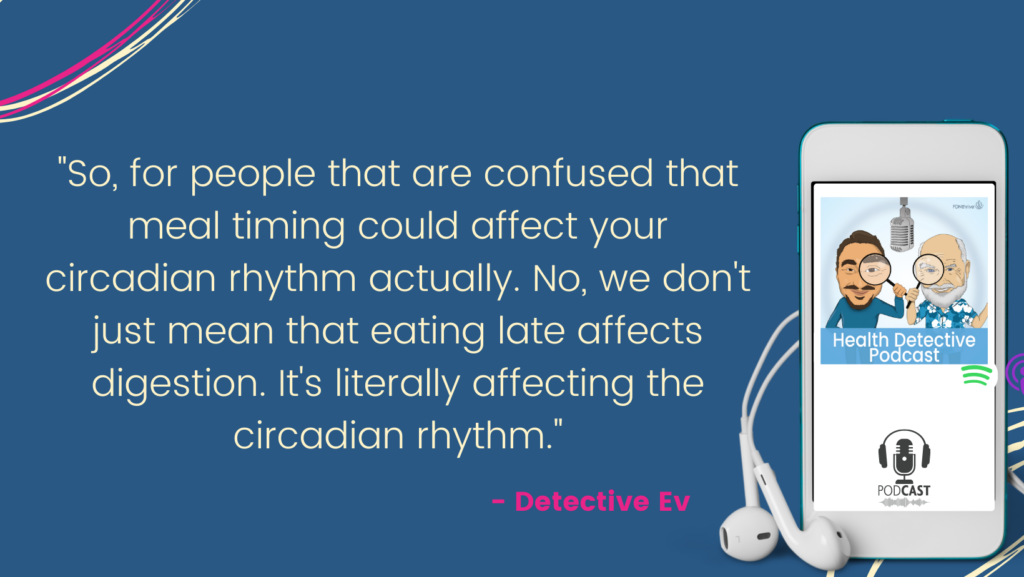
[00:42:58] Detective Ev: Yeah. Yeah. I think this was one of the first things that came out with this showing legitimately that meal timing does affect it. So, for people that are confused that meal timing could affect your circadian rhythm actually. No, we don’t just mean that eating late affects digestion. It’s literally affecting the circadian rhythm. Could you give us a little info on that and like what that means? Maybe what’s the optimal mealtime for people?

[00:43:15] Mollie: Yes. I’m so glad you mentioned that because I don’t want to leave us hanging with that circadian rhythm entrainment conversation and some of the big, heavy hitters. So, we talked about light, we talked about temperature. Now nestled under temperature, the things that could shift our temperature in either in alignment with strengthening our circadian rhythm or counter. One of the big ones is about meals – meal timing, and meal type.
Those two things can really hugely shift our body temperature but also our glucose levels. Just the process of turning on a digestive system at counterproductive times would tell the body presumably if we’re eating at 9:00 PM, we must need to be making energy for something.
So, something must be coming, or it must be doing something. It’s sending the wrong signals at the wrong time. If people want to learn more about this, Dr. Satchin Panda is absolutely a fantastic source point. He wrote the book, The Circadian Code. He has decades of information on the Salk Institute.
So, looking at how closely tied these two things are, we want to look at our first bite. What time are we having our first bite of food? And what time are we having our last bite of food? According to The Circadian Code, now there’s lots of different things of how people quantify when you’re fasting or when you’re not fasting.
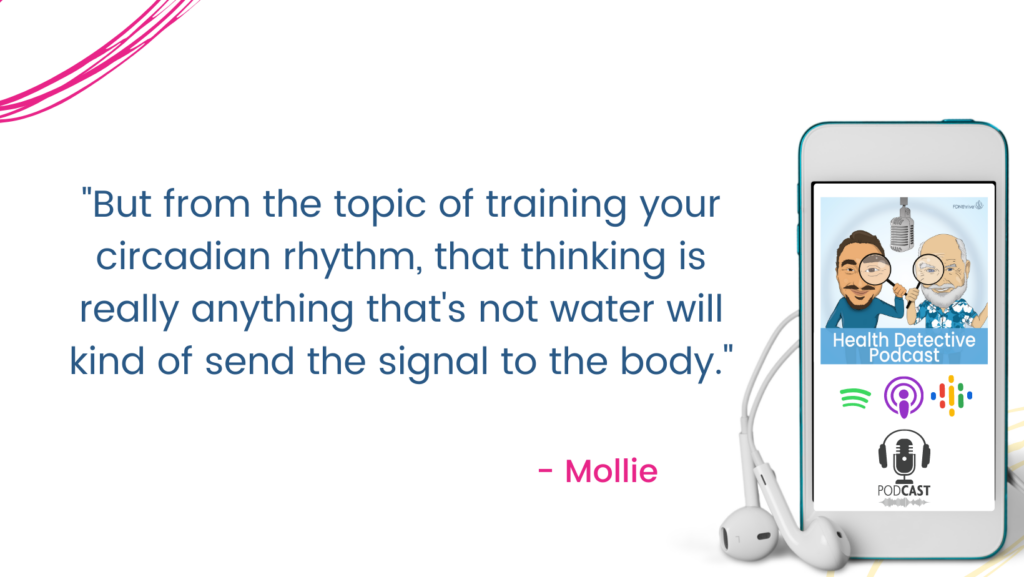
Does this involve a coffee? Does this involve a tea? People go nuts on the topic and for good reason, cause it’s confusing. But from the topic of training your circadian rhythm, that thinking is really anything that’s not water will kind of send the signal to the body. Cause virtually every single cell in our body has a clock.
There’s both the peripheral clocks throughout your body, and your central master clock, that SCN – that suprachiasmatic nucleus. Keeping these things all on time is a job. So, if we have something coming outside of that meal timing rung, then that can confuse the body on what it should be doing and when.
What I see most commonly, because every client we have, they’re wearing different wearable trackers. Often, they may be wearing continuous glucose monitors at the same time. And we did kind of a focus group through levels, an Oura ring, and overlaid people’s continuous glucose data and their Oura ring data. One thing that we found that was really just a small kind of group of people, so very informal, but still really cool. Throughout that process, one of the things that we did seem to find was that as people are eating later then we would either find more inconsistency with their bed timing – their goal timing, their sleep latency, and we would often particularly find an uptick in wakeups.

That did depend on a couple of things. It was, what type of foods are they having? But particularly that timing became really important because also just no matter what you’re eating, if you are going through the process of digesting, it is a taxing process on the body. Has to be all this blood flow sent to the stomach, and we’re having to deal with this. We’ll find often this uptick in body temperature as a result of digestion, and often there could be other things too. This can get really layered. That’s why sleep can be a skill because you might have histamine issues. So then that might keep you more up.
And there are so many things that can come as a result of the timing of your type of food and how that can play a role in your sleep. But for the simple process, one of the things that we suggest people play with is something called circadian rhythm, interment fasting. Again, this is bio-individual of course, consult with your doctor and et cetera, et cetera.
Circadian Rhythm Intermittent Fasting
But if you play with something like circadian rhythm, intermittent fasting, what that is is a kind of a fancy set of words, where you’re eating between sunrise and sunset at the very least. And you’re aiming to do that throughout the entire year. If you start to kind of deviate and go into more of the periods of darkness, you want to just try to course, correct yourself a little bit back.
But by and large, we find that that is helpful for really this balance of blood sugar and insulin that seems to get disrupted the later we go into the evenings and the closer that is to our bedtime.
[00:47:04] Detective Ev: Wonderful. Yeah. At this point, like, you don’t want to limit yourself in today’s modern world. You got to find your unique balance, everyone. I don’t even want to go eat at the restaurant at 7:00 or 8:00 PM anymore. I don’t feel good. Especially like, when you’re going out, what do you get? You’re going to get something fun. You get like a damn steak or whatever. That is the worst thing I could possibly eat late at night.
It just does not work for me. Now again, maybe if you’re going to bed at 2:00 AM, you’re not even really noticing that effect. But for someone that’s going to bed at 9:30, 10:00, yeah. If I go ahead and have a steak at 7:00, not even a question, that will affect me every single time, very strong.
Yeah. Well, we are just about to wrap up. I’m going to ask her a signature question, but Mollie, where can people find you? And also, even though you’ve said it a few times, like, who is your kind of ideal client? I always like to ask people that so that if a listener is listening and saying, hey, Mollie seems cool. Like, I want them to know that they’re the right person for you as well.
Who’s the ideal client. And what do you offer? Where can they find you?
Ideal Client
[00:47:51] Mollie: Yeah, absolutely.
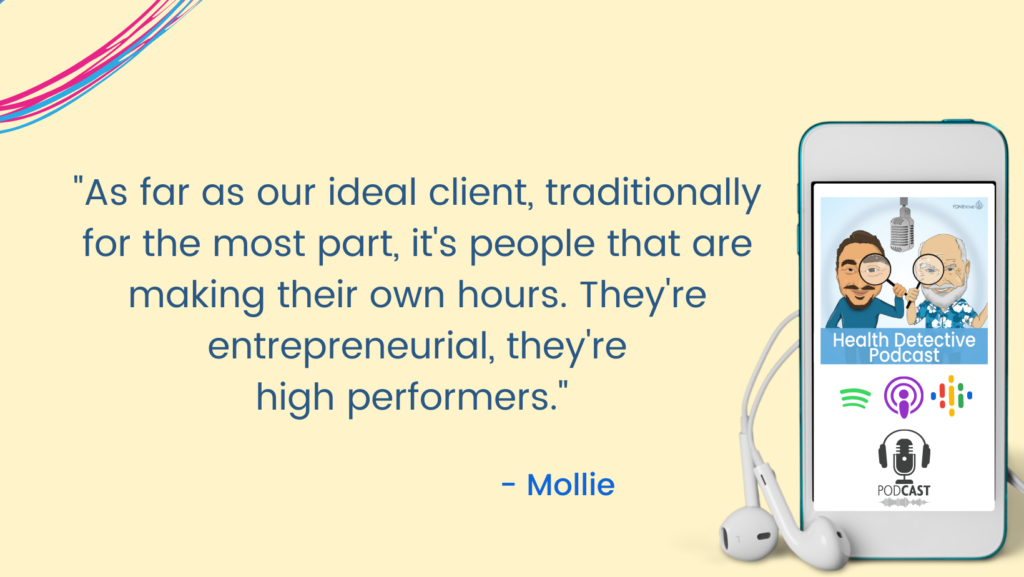
As far as our ideal client, traditionally for the most part, it’s people that are making their own hours. They’re entrepreneurial, they’re high performers. There’s a lot of different groups that seem to struggle with that ability to have the freedom to make their own schedules. But at the same time, it can be this blessing and a curse. And then are looking to really up level their performance, their productivity. I’m kind of curious about where they’re at and how they’re performing and how they can get excited about the fact that they can often make that difference.

But we want to do as much to help support different types of groups. At the same time, we’ve worked with different people that are shift workers. We’ll work with different people, still might have more of a nine to five, but at the same time they are still struggling with created consistency.
We really are looking to be a part of the sleep improvement process for people that are clear that this can really support their lives and their health. But with that, there’s lots of different ways that people can be a part of that. We try to have many different tiers of involvement.
Detective Ev: And where can people find you?
Where To Find Mollie
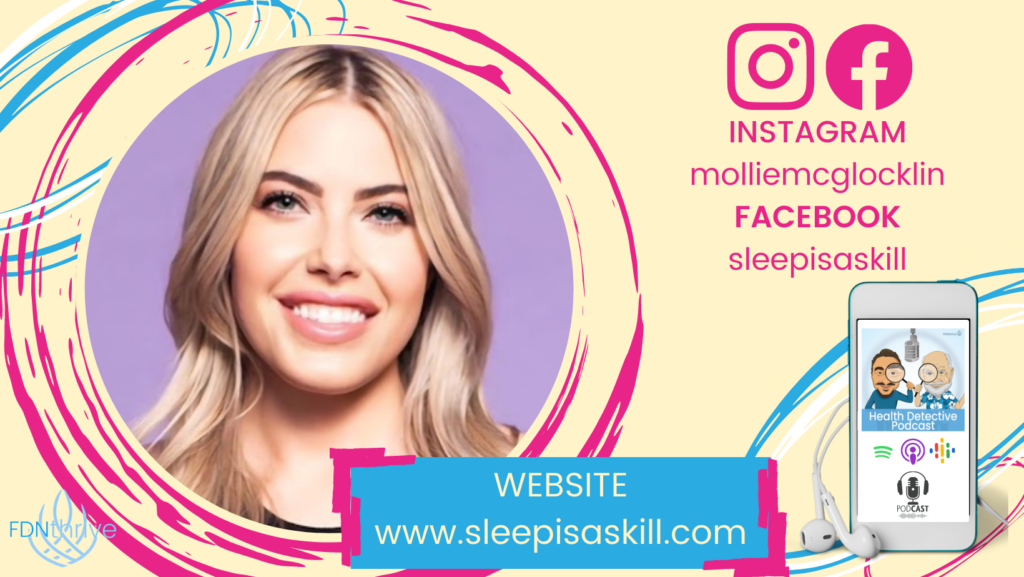
Mollie: Oh, thank you. The where, so sleepisaskill.com really acts as a bucket for all kinds of things. Once you’re there, couple of things you can do. You can take a sleep assessment and then you’ll get kind of targeted information back specifically for what you’re dealing with your sleep right away.
But then also we have a weekly newsletter. We’ve been going on, I think 180, like two editions, every single Monday. We don’t miss a Monday. Our aim is to get you sort of like as much information, have it be the most obsessive newsletter on sleep that we can put out. We have lots of different things from our clients or readers or followers that are testing different things with their sleep, and often there are stats involved with that, breaking those down, which is really interesting.
Then we also have the podcast – the Sleep Is A Skill podcast, that has lots of different sleep experts and latest and greatest sleep tech or approaches or what have you. Then you can also, if you’re still from that place, struggling, you can either get all that free information you know, consistently.
We also do online, different sleep spotlights, like on IGTV and those sorts of things to have consistent information. But if you’re still struggling from there, then we also have both 90-day programs for one-on-ones and small groups.
[00:50:03] Detective Ev: Great name too. So easy to remember, Sleep Is A Skill.
Mollie’s Magic Wand
All right. We will finish up today with the signature question on the Health Detective Podcast. This is fun, cause this could kind of go a few ways depending on how specific you get. But anyway, the question is, if we were able to give Mollie a magic wand and you could get every single person in this world to do one thing for their health or get them to stop doing one thing, what is the one thing you’d get them to do?
[00:50:27] Mollie: Oh my God. Well, clearly, I’m biased. But it would be all about prioritizing sleep in that process. If you’re someone that’s listening and you are looking to improve your health, to kind of restructure that pyramid of health. You might be thinking of, well it’s a new year, so I’m going to get the nutritionist and the personal trainer and the this, and the that.

Instead, how can we learn about and prioritize our sleep and put that on the really most crucial foundational rung? Because from that place, then the “going to the gym” and “the eating well,” and all those things are much more likely to happen consistently. Because what is the first thing that gets cut? Often, if we’re not sleeping, then suddenly it’s, we’re too tired to get to the gym and we make the poor choices cause our glucose levels are higher and all these things are happening with our sleep.
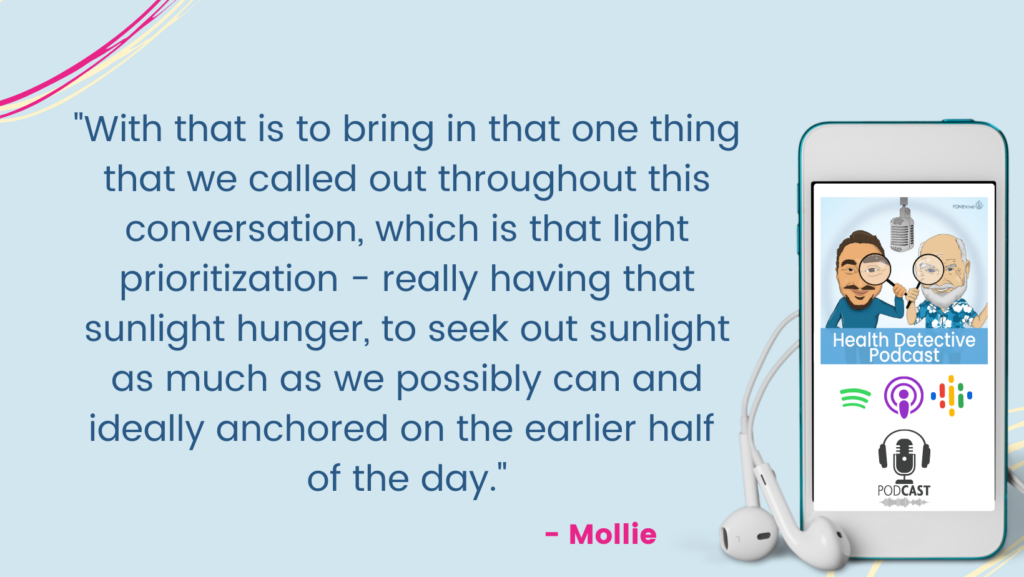
Prioritizing that sleep. I don’t know if I can have like an asterix with it, but with that is to bring in that one thing that we called out throughout this conversation, which is that light prioritization – really having that sunlight hunger, to seek out sunlight as much as we possibly can and ideally anchored on the earlier half of the day. That can be such a grounding practice for people and just such a tangible and almost innate thing of like, yes, this feels right for most people. Once they start doing that, it can just kind of help all the other practices fall into place.
Because if I didn’t explain it well enough, I want to just also say that based on when you see that first shot of bright light in your day, that kind of creates this invisible countdown clock. Where from that point, then it will kind of choose the time that you are going to get tired later on in the evening.
There’s a very real cause and effect if you’re not seeing your brightest shot of light until, back when I used to wake up so late, it might be 12:00, 1:00 in the afternoon, when you’re getting that big, bright of a shot of light. Then of course, from that place, I’m not going to get tired til another, 16 hours after that. So, it’s going to be real late. You want to also get that there’s a very clear mechanism happening here and it’s not just sort of like a nice thing to do.
[00:52:30] Detective Ev: All right, Mollie. Thanks so much for coming on today.
[00:52:31] Mollie: Oh, well, thank you so much for having me. I’m so happy to be connected. And thank you for the work that you’re doing, also just being an example for someone at a relatively young age to be showing what’s possible in prioritizing your health and how to kind of have it all work within your life.
Detective Ev: Absolutely.
[00:52:48] Intro/Outro Voice: Thanks for tuning into the Health Detective Podcast. If you are ready to finally work with a real health detective on your health journey so that you can get well and stay well naturally, visit us at fdnthrive.com and click the “Get Started Here” button.

